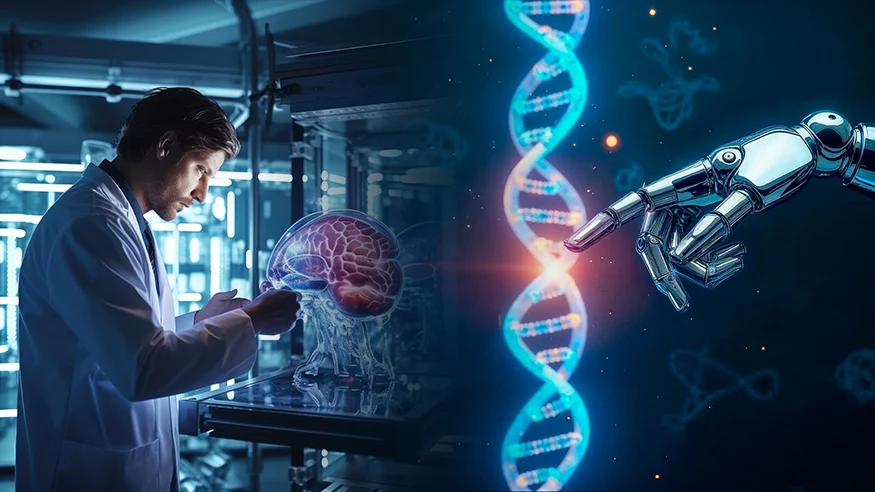15 Deep Learning Specialization Courses for Skill Growth in 2026
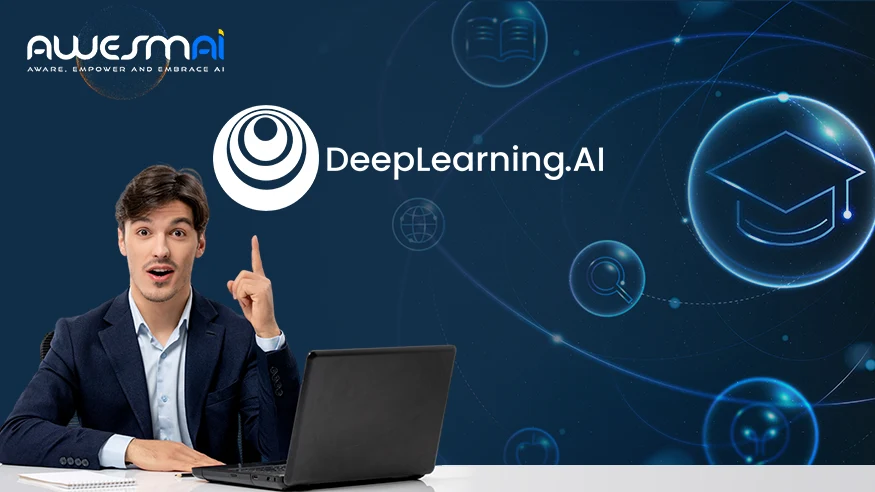
We get it – the moment someone says “Deep Learning,” your brain goes like, “This sounds too technical!” But you don’t need to be tech-savvy to start using it like a pro. Did you know you can actually boost your resume and career prospects with a prestigious deep learning specialization course?
Today, companies are not hiring programmers. They are hiring minds that can teach machines how to think and act. All you need are the right deep learning courses to upskill yourself for the changing job market. And that’s exactly what we are breaking down here.
By the end, you won’t just be using deep learning, but you will be winning with it! Come join us and make AI your new superpower in 2026!
What is Deep Learning?
Before you pursue any deep learning classes, you should first learn what deep learning actually is. Think of your brain as a web of connections that helps you make decisions within seconds. Deep learning works exactly in the same way!
Deep learning is a subset of AI that enables computers to think, learn, and react like humans. It’s also closely related to machine learning but much more sophisticated. While machine learning deals with small tasks and patterns, deep learning does the heavy-lifting like image recognition, speech translation, self-driving cars, and a whole lot more!
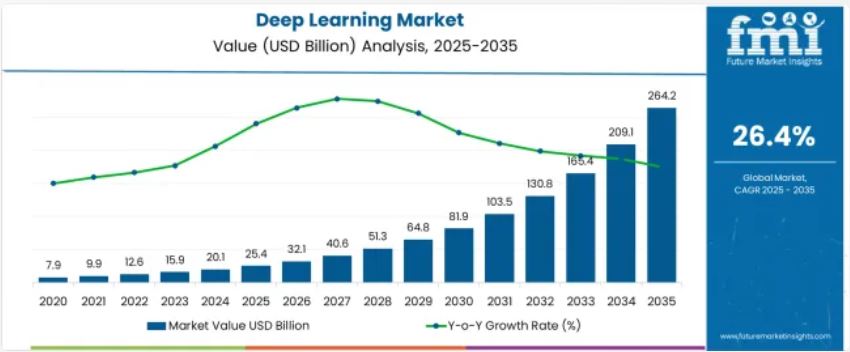
The global deep learning market is expected to reach up to $264.3 billion by 2035, denoting its importance in the jobs of tomorrow. A recent report by The Interview Guys says, “Those with AI skills can potentially earn 19 %‑56 % more than their peers without them,” based on a 2026 analysis of 15 major studies. Deep learning specialization is non-negotiable for skill growth!
Expert Quote: As Yann LeCun, a Chief AI Scientist, Meta/Facebook says, “AI’s future depends on our ability to create systems that can learn, reason, and act, not just memorize. Mastering deep learning is the foundation for building that future!”
How Deep Learning Differs from Machine Learning?
The debate around deep learning vs. machine learning is gaining new momentum. But what truly sets them apart?
Traditional machine learning isn’t that hard. We just tell a computer what to look at. For example, we might say the color, size, and form of a fruit to help someone recognize it.
But we don’t have to do that with deep learning. The system learns to recognize these traits on its own. It looks at thousands of pictures of fruit and slowly learns how to picture an apple. Machine learning follows precise rules, but deep learning looks for patterns.
This advanced feature is necessary for deep learning for AI applications. Therefore, acquiring a solid deep learning education is becoming crucial for anyone entering the field of artificial intelligence in 2026.
Is It Worth It to Get a Deep Learning Specialization?
Definitely, one of the best things you can do in 2026 is to invest in a deep learning specialization. In fact, job postings requiring AI or deep learning skills have grown over 150% in the past five years. And usually, a deep learning online course offers job positions with better pay and long-term stability.
No doubt, AI-powered tools and platforms have become mainstream now. Expertise in deep learning can open up even more career opportunities. If you’re wondering whether to start now, the answer is yes. Deep learning skills are no longer optional. They are a must in today’s AI world for getting high-paying deep learning jobs.
Industries Using Deep Learning
Deep learning is shaping the world across many industries. Below are a few examples explained in simple words –
- Healthcare: AI can spot diseases from X-rays. It can also help detect early signs of illness and even suggest better treatment options, sometimes faster than humans can.
- Finance: Banks and financial companies in today’s world use deep learning to prevent fraud before it happens, also to make wiser data-driven investment decisions.
- Robotics and Self-driving Cars: Deep learning helps machines to perceive their surroundings. So, they can observe, react, and make split-second decisions safely.
- NLP: While you’re speaking to a voice assistant, it’s deep learning working behind the scenes. It helps the system understand your words and respond naturally.
Whether your interest lies in any domain, you can be highly employable in that specific field.
15 Best Deep Learning Specialization Courses for 2026
Are you thrilled about the possibility to lead innovation by identifying value in data that isn’t obvious? These are the 15 AI specialization courses to take in 2026 if you want to learn deep learning.
#1. Deeplearning.AI – Deep Learning Specialization
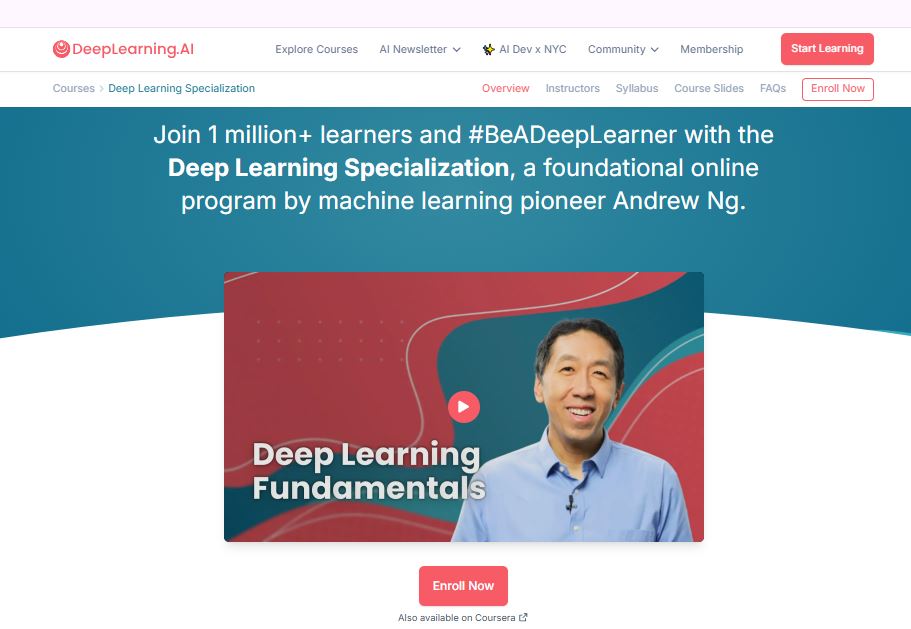
Image Credit: Deeplearning.AI
This deep learning specialization is an excellent way to get started with deep learning. This course is taught by Andrew Ng, a well-known figure in AI and the co-founder of Coursera.
This deep learning specialization by Andrew NG will teach you neural network architectures, theoretical concepts, and practical applications using Python and TensorFlow. If you want to learn how deep learning actually works – rather than just getting a surface-level description – go for it!
Key Takeaways:
- Learn about the many parts of a neural network, like the input, hidden, and output layers.
- Understand how to use forward and backward propagation in neural networks.
- Learn how to use vectorization to speed up model training.
- Understand the math behind deep learning (cost functions, gradients)
- Learn how to build and train neural networks using Python and NumPy.
- Choose the correct neural network architecture
- Use deep learning to solve real-world challenges and computer vision problems
- Set up machine learning challenges from the point of view of deep learning
Prerequisites:
- Intermediate Python programming
- Basic linear algebra (matrix/vector operations)
- Understanding of machine learning fundamentals
| Platform | Coursera |
| Instructors | Andrew Ng, Kian Katanforoosh, Younes Bensouda Mourri |
| Duration | 5 courses; ~5 weeks each at 5 hrs/week |
| Level | Intermediate |
| Free/Paid | Paid ($49/month) |
| Ratings | 4.9 |
#2. Coursera – Neural Networks and Deep Learning
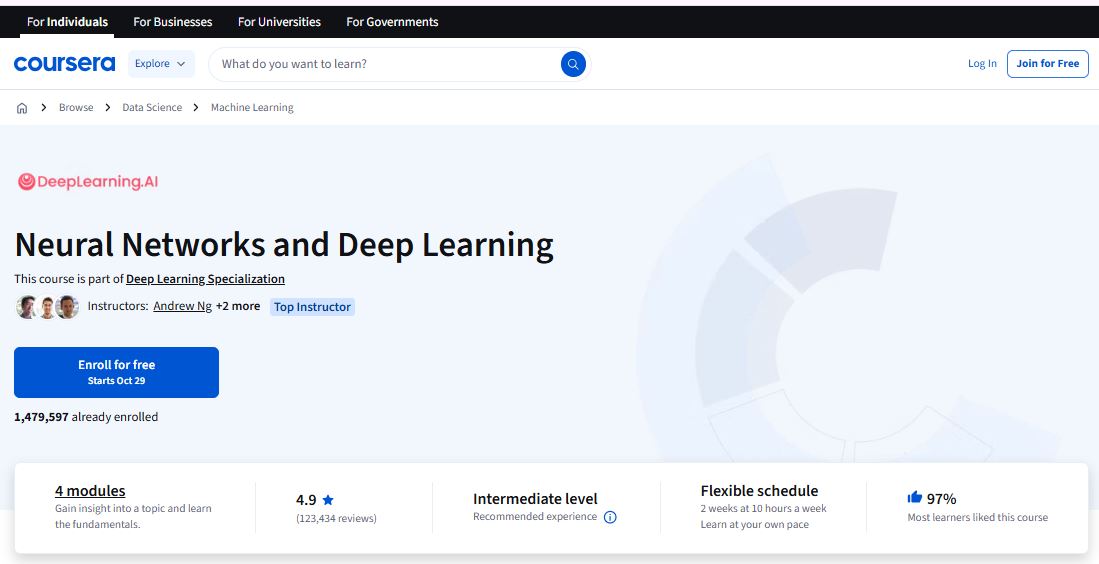
Image Credit: Coursera
The Coursera deep learning specialization is an intermediate-level specialization from DeepLearning.AI. This course is designed to provide you with a foundational understanding and practical skill sets required to build, train, and optimize different neural network architectures that include LSTMs, CNNs, Transformers, recurrent neural networks, etc.
Key Takeaways:
- A hands-on curriculum that covers different parts of Deep Learning
- Build and train deep neural networks (CNNs, RNNs, LSTMs, Transformers)
- Use TensorFlow for full-stack DL projects.
- Use the best practices in the field for training, bias/variance analysis, and optimization.
- Use advanced DL techniques like transfer, multi-task, and end-to-end learning.
- Work with images, videos, natural language processing, and sequence data
Prerequisites:
- Basic knowledge of linear algebra and machine learning
- Intermediate Python programming
| Platform | Coursera |
| Instructor | Andrew Ng, Kian Katanforoosh, Younes Bensouda Mourri |
| Duration | 5 courses, each lasting about 5 weeks (5 hours a week) |
| Level | Intermediate |
| Free/Paid | Paid ($49/month) |
| Ratings | 4.9 |
#3. IBM – Deep Learning with PyTorch, Keras and Tensorflow Professional Certificate
This hands-on, career-ready learning program is thought to be the best PyTorch course on the market right now! This all-in-one deep learning course will teach you how to use Python and popular libraries like Keras, PyTorch, TensorFlow, and others to build, train, and deploy models for both basic and advanced AI projects.
Key Takeaways:
- Learn the basics of ML and DL with Python
- Create transformer models for sequential/time series data
- Build, train, and deploy deep learning models
- Use Keras, PyTorch, and TensorFlow to solve real-world problems in the industry.
- Get hands-on experience with labs and projects like object recognition, NLP, and making your own layers and models.
Prerequisites:
- Ability to use Python
- Math at the high school level
| Platform | Coursera |
| Instructor | IBM team (W. Fulmyk, R. Shi, A. Aggarwal, T. Migmar, R. Kienzler, J. Santarcangelo, A. Aklson, S. Madhavan, J. Nilmeier) |
| Duration | 10 hours a week for 2 months |
| Level | Intermediate |
| Free/Paid | Free |
| Ratings | 4.4 |
#4. Udemy – Deep Learning Specialization: Advanced AI, Hands on Lab
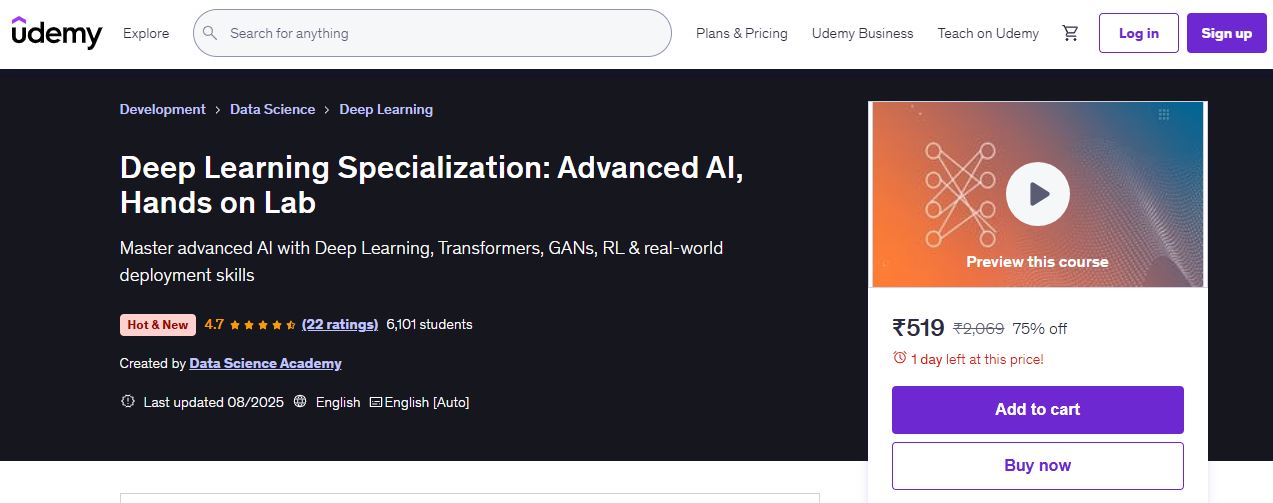
Image Credit: Udemy
If you’re looking for the best deep learning with Python course, this one is a great pick. This program is hands-on and project-based. You will learn how to use advanced deep learning models and AI in the real world through weekly coding labs and hands-on projects.
Key Takeaways:
- Create and train advanced models like CNNs, RNNs, Transformers, GANs, and Diffusion Models.
- Use reinforcement learning techniques like Q-Learning, DQNs, and Policy Gradients.
- Deploy models using Flask, FastAPI, Docker, AWS/GCP/Azure.
Prerequisites:
- A basic understanding of Python
- A basic understanding of machine learning
- A cursory understanding of linear algebra and probability
- An optional understanding of deep learning frameworks
| Platform | Udemy |
| Instructor | Data Science Academy |
| Duration | 8 weeks |
| Level | Intermediate |
| Free/Paid | Paid |
| Ratings | 4.7 |
#5. Udacity – deep-learning-nanodegree
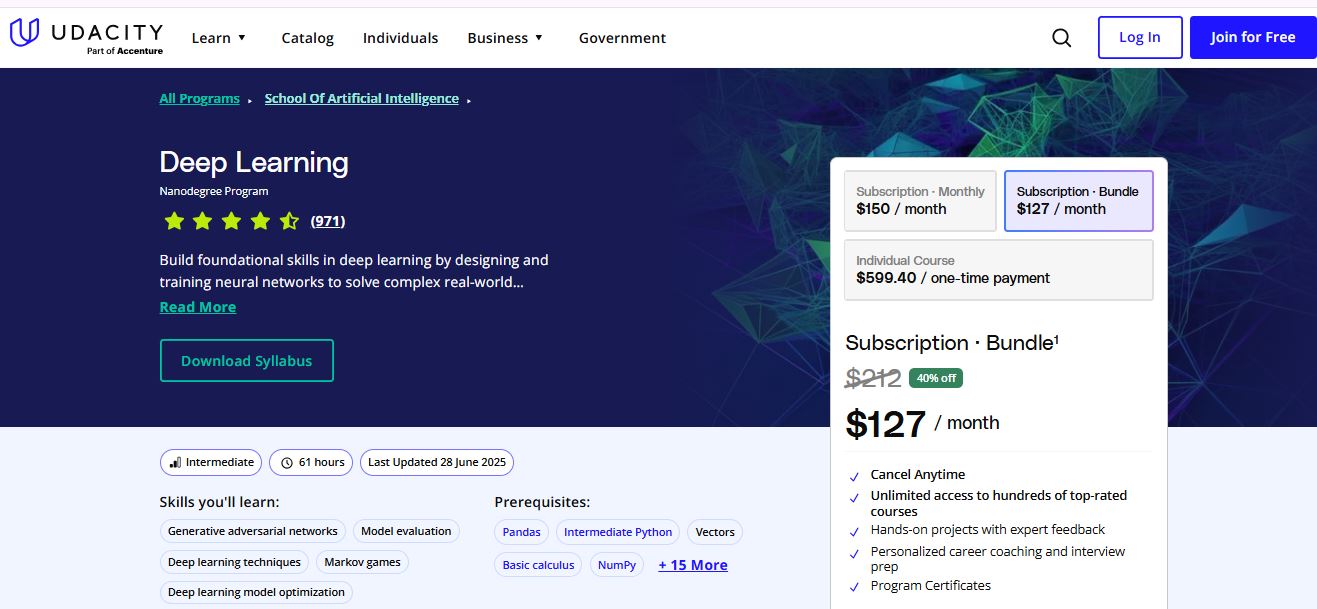
Image Credit: Udacity
This Udacity deep learning program is project-based and teaches you how to make and train neural networks like CNNs, RNNs, and GANs. Students will learn by doing AI projects in the real world and in labs.
Key Takeaways:
- Train and build neural networks to solve problems in the real world
- Move from simple models to more complex ones, like CNNs, RNNs, Transformers, and GANs.
- Use deep learning for image classification, sentiment analysis, and face generation.
- Get hands-on experience with PyTorch and NumPy.
Prerequisites:
- Intermediate knowledge of Python, Pandas, NumPy, and matplotlib
- Basic knowledge of calculus, linear algebra, and probability
- Basic knowledge of machine learning and deep learning
- Ability to speak English fluently
| Platform | Udacity |
| Instructor | Giacomo Vianello, Nathan Klarer, Erick Galinkin, Thomas Hossler |
| Duration | 61 hours |
| Level | Intermediate |
| Free/Paid | Paid |
| Ratings | 4.7 |
#6. Classcentral – Intro to Deep Learning with PyTorch
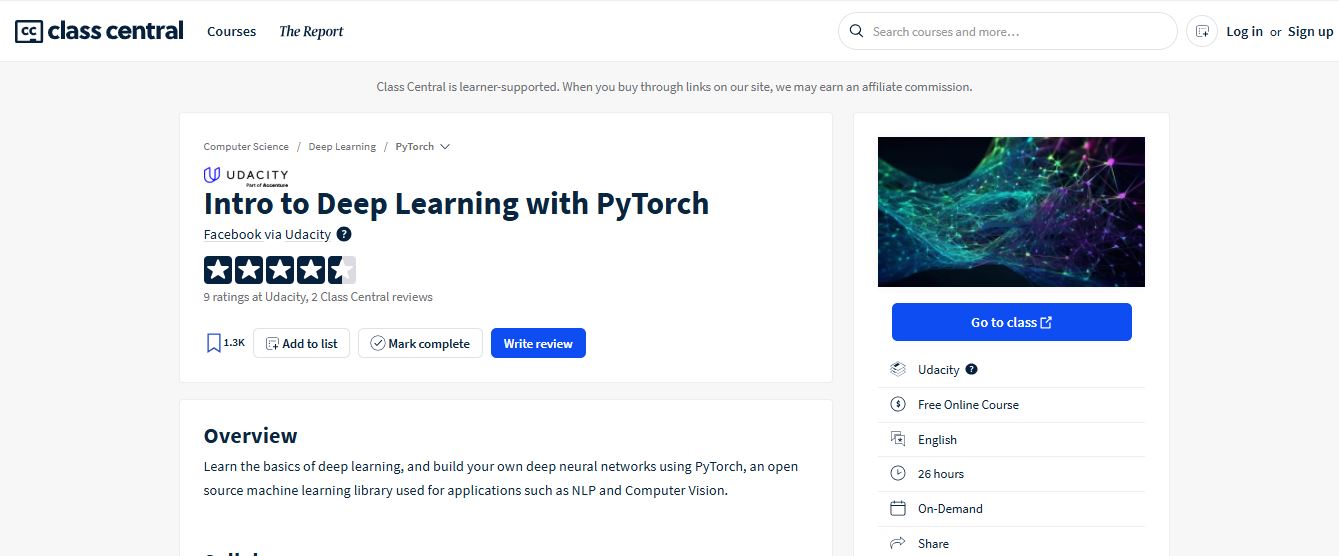
Intro to Deep Learning with PyTorch is a deep learning course free with certificate program that’s meant for beginners. It teaches you the basics of building neural networks for NLP and computer vision using the PyTorch framework and real coding.
Key Takeaways:
- Learn the basics of deep learning and how to make neural networks in PyTorch
- Train models for vision and NLP tasks (like image classification)
- Learn how to use forward and backward propagation and training data workflows.
- Look into CNNs for computer vision, such as transferring artistic styles
Prerequisites:
- You don’t need any experience (the course is for beginners)
- Helpful: Basic Python, working with arrays/tensors, and some machine learning concepts
- Willingness to learn core math (gradients, loss functions)
| Platform | Facebook via Udacity |
| Instructor | Luis Serrano, Alexis Cook, Soumith Chintala, Cezanne Camacho, Mat Leonard |
| Duration | 26 hours |
| Level | Beginner |
| Free/Paid | Free |
| Ratings | 4.5 |
#7. Stanford- CS230 Deep Learning
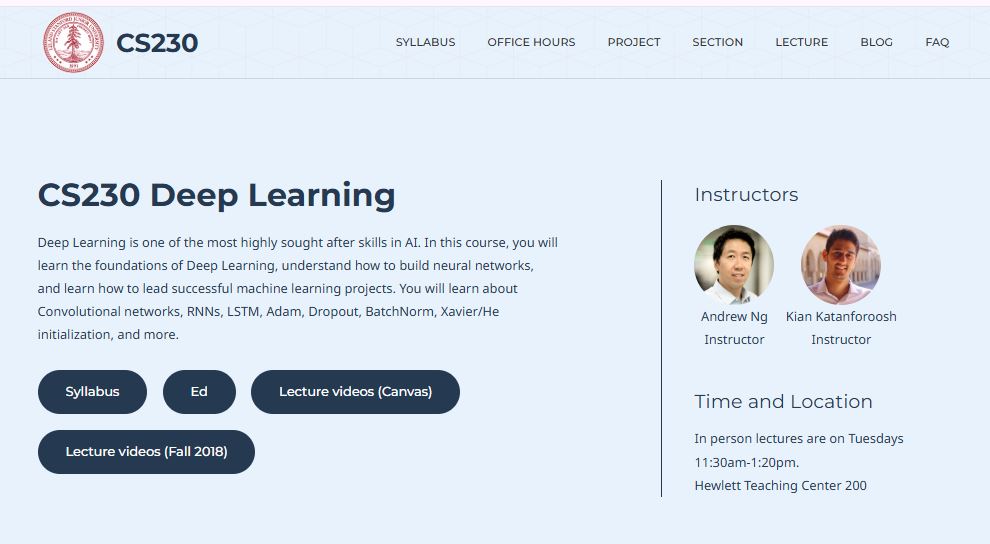
Image Credit: https://cs230.stanford.edu/
This is a full deep learning certification program that teaches you the basics and more advanced uses of neural networks. The main things this course covers are hands-on projects, core architectures, and real-world AI solutions.
Key Takeaways:
- Use deep learning algorithms in the real world, not just in theory
- Plan and present a big deep learning project
- Learn about core architectures like CNNs, RNNs, generative models, and transfer learning
- Learn the best ways to do things like data augmentation, hyperparameter tuning, batch norm, and regularization
- Find out how to set up and run deep learning projects, including datasets, metrics, and deployment.
Prerequisites
- Linear algebra
- Basic statistics, data science, and probability theory
- Computer science basics (can write simple programs)
- A bachelor’s degree with a GPA of at least 3.0 is recommended
| Platform | CS230 Ed Forum |
| Instructor | Andrew Ng, Kian Katanforoosh |
| Duration | 10 weeks, 9–15 hrs/week |
| Level | Bachelor’s degree (3.0+ GPA recommended) |
| Free/Paid | Paid ($6,300) |
| Ratings | Not mentioned |
#8. Edx- Deep Learning with Python and PyTorch
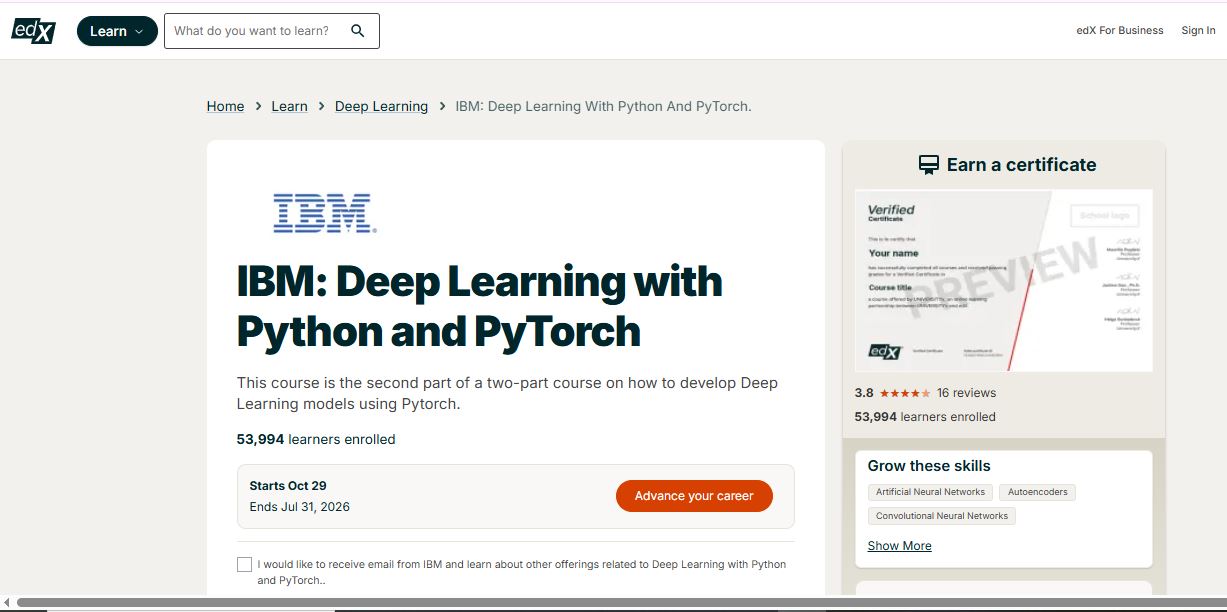
Image Credit: Edx
This practical, project-focused online course deep learning (part two of a series) guides you in building, training, and optimizing deep neural networks using PyTorch. Students will also cover different topics – from advanced network architectures to multiclass classification and real-world applications.
Key Takeaways
- Use PyTorch to build and train deep neural networks
- Use the best deep learning methods, like dropout, batch norm, and optimizers.
- Build useful deep learning pipelines (data → model → evaluation)
- Learn how to use softmax regression, design networks, and backpropagation.
Prerequisites
- Knowing the basics of PyTorch
- Having hands-on experience with machine learning
- Recommended: Finish “PyTorch Basics for Machine Learning” (Part 1)
| Platform | edX |
| Instructor | Joseph Santarcangelo, IBM |
| Duration | 6 weeks (2–4 hours per week) |
| Level | Intermediate (a bit of experience is needed) |
| Free/Paid | Paid |
| Ratings | Not mentioned |
#9. Codecademy- Build Deep Learning Models with TensorFlow
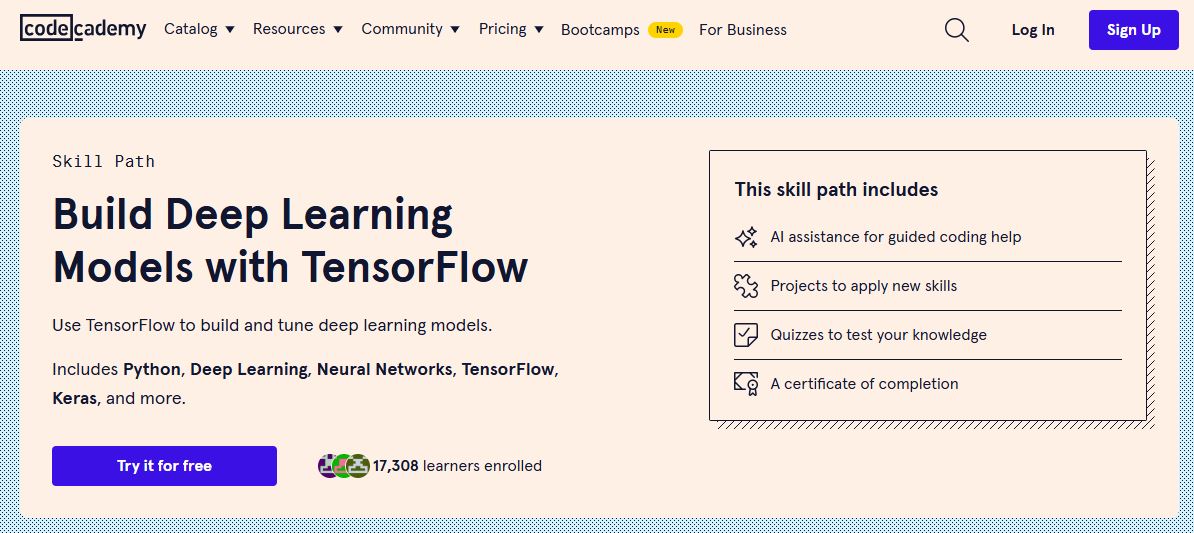
Image Credit: Codecademy
This deep learning program is great for people who want to learn how to build, tune, and use models with Keras and TensorFlow. Throughout the program, students will work on real-world use cases and hands-on projects.
Key Takeaways:
- Use TensorFlow and Keras to train and improve neural networks
- Create neural network architectures (like perceptrons and hidden layers)
- Use models for regression and classification tasks (like classifying images)
- Finish a portfolio project to show off your skills
Prerequisites
- It’s best to finish “Learn Machine Learning” on Codecademy first.
- You should be comfortable with Python programming.
- You must know the basics of ML or neural networks.
| Platform | Codecademy |
| Instructor | Kenny Lin |
| Duration | 10 hours |
| Level | Intermediate |
| Free/Paid | Paid (Pro required) |
| Ratings | Not mentioned |
#10. Datacamp – Introduction to Deep Learning in Python
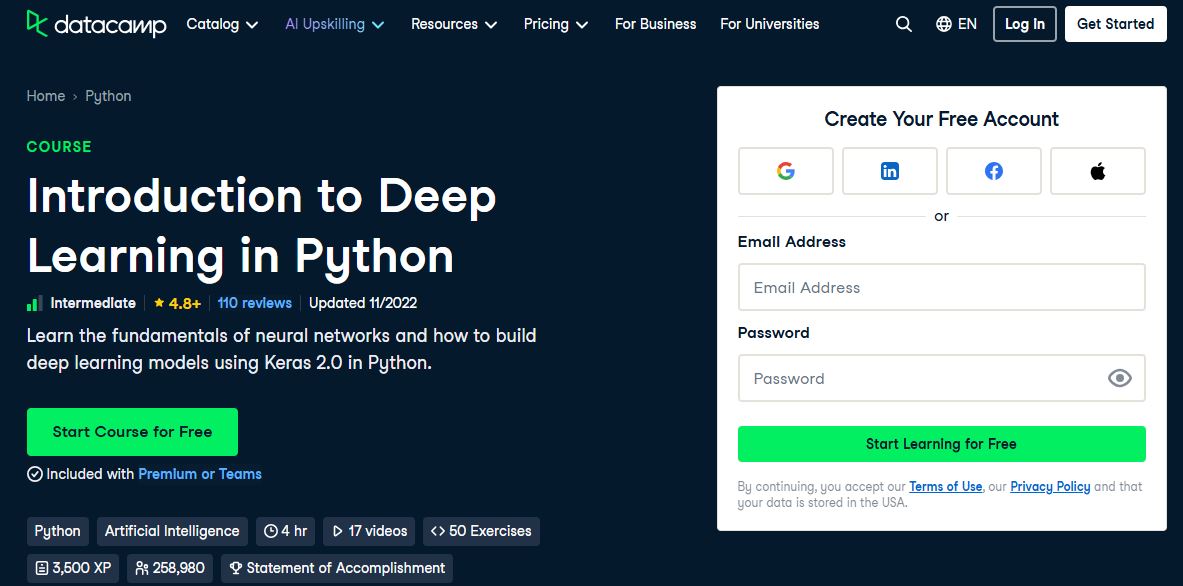
Image Credit: Datacamp
This deep learning free course will teach you how to use Python and Keras to build, train, and improve neural network models. It’s a great choice for quickly using deep learning on real-world AI tasks because DataCamp offers a free trial, and you can keep using it after that with a subscription.
Key Takeaways:
- Use Keras 2.0 to make deep learning models in Python
- Understand the basics of neural networks (forward and backward propagation)
- Make regression and classification models (binary and multiclass)
- Test and improve deep networks (capacity, validation, early stopping)
Prerequisites:
- Knowing the basics of machine learning (supervised learning, regression/classification)
- Prior experience with Python (especially Keras)
| Platform | DataCamp |
| Instructor | Dan Becker |
| Duration | 4 hours |
| Level | Intermediate |
| Free/Paid | Paid (subscription) |
| Ratings | 4.8 |
#11. Mindmajix – Deep Learning with Python Training
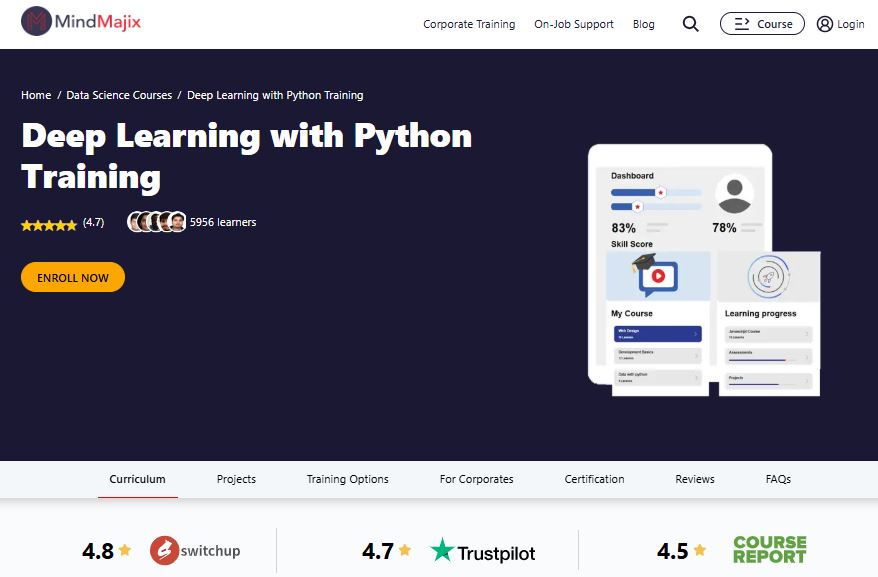
Image Credit: Mindmajix
This program is for professionals who want to get real-world experience with real-time projects. This program is thought to be one of the best deep learning courses. It covers RNNs, DNNs, TensorFlow, and the newest ways to use deep learning.
Key Takeaways:
- Learn how to use RNNs for things like recognizing activities, writing captions for images, translating text, and recognizing speech.
- Learn about deep neural networks (neurons and perception)
- Learn about RNN architecture, such as fixed and infinite memory models, vanishing gradients, LSTM, and GRU.
- Use RNNs to classify TensorFlow text
- Build, train, and test RNNs in TensorFlow
Prerequisites:
- A basic understanding of programming and computers
- Knowing how to use Python and basic ideas about machine learning
| Platform | MindMajix |
| Instructor | Not specified |
| Duration | 25 hrs self-paced + 25 hrs live/online (1 yr access) |
| Level | Intermediate/Professional |
| Free/Paid | Paid |
| Ratings | 4.7 |
#12. Simplilearn- Deep Learning Course (with Keras & TensorFlow) Certification Training
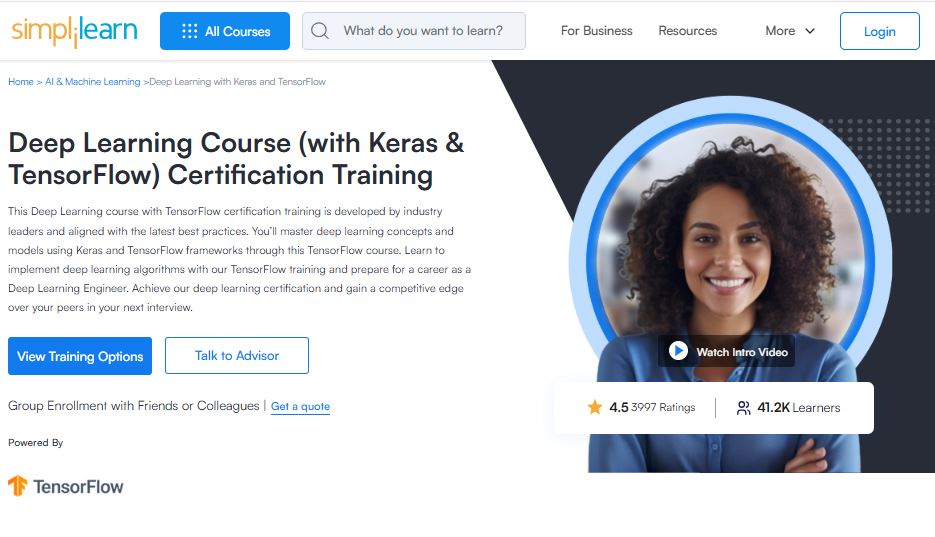
Image Credit: Simplilearn
Are deep learning AI courses worth it? Pursue this course as this is certainly worthy of your time and trust. This certification program covers both the basics and advanced topics, which include neural networks, Keras, TensorFlow, and PyTorch. You will also learn how to build and deploy deep learning models for real-world AI projects.
Key Takeaways:
- Get a good understanding of Keras, TensorFlow, PyTorch, and neural networks
- Use optimization methods (ADAM, Adagrad, momentum) and fix problems with deep learning models
- Make models work better (hyperparameters, architectures, overfitting, regularization)
- Get ready for jobs like Deep Learning Engineer, Data Scientist, or ML Engineer
Prerequisites:
- A bachelor’s degree or a high school diploma
- Knowledge of the basics of programming
- Understanding of basic math and statistics
| Platform | Simplilearn |
| Instructor | Industry experts (DL/ML) |
| Duration | ~34 hours |
| Level | Intermediate/Advanced |
| Free/Paid | Paid |
| Ratings | 4.5 |
#13. Udemy – Deep Learning A-Z 2026: Neural Networks, AI & ChatGPT Prize
This well-known and popular program should be on any list of the best deep learning specialization courses. Students will learn how to make, train, and use important models like ANN, CNN, RNN, autoencoders, and Boltzmann machines. This specialization course uses Python, real data sets, and code templates that you can use yourself.
Key Takeaways:
- Learn how to use and comprehend the main deep learning architectures (ANN, CNN, RNN, autoencoders)
- Employ deep learning on real-world datasets including customer churn, picture identification, and stock prediction
- Work on coding exercises, labs, and code templates that you can use over and over again.
- Learn when and how to employ more complex models, such as autoencoders and Boltzmann machines.
Prerequisites:
- Some experience with Python programming
- Understanding of basic machine learning and neural network concepts
- Comfortable working in Jupyter notebooks or something similar
| Platform | Udemy |
| Instructor | Kirill Eremenko, Hadelin de Ponteves |
| Duration | 22 hours of video |
| Level | All levels* |
| Free/Paid | Paid |
| Ratings | 4.6 |
#14. Pluralsight-Introduction to Deep Learning
This brief and useful course is one of the best deep learning courses for beginners. It presents a detailed picture of neural networks, image and audio recognition, recommendation systems, and transformer models. There are 10 short courses on the road that total up to 7 hours, so it’s quite easy to study in tiny amounts.
Key Takeaways:
- Learn the basics of neural networks and how to train them
- Use deep learning for image recognition (CNNs)
- Use RNNs for speech/audio recognition and time series data
- Get to know transformers and large language models (LLMs)
- Get a good base for more advanced ML/DL work
Prerequisites:
- Basic knowledge of machine learning and neural networks
- Good at Python
- Experience with processing and manipulating data
| Platform | Pluralsight |
| Instructor | Pratheerth Padman, Anand Saravanan, Alper Tellioglu, Mohamed Echout, Daniel Stern, Axel Sirota, Pinal Dave, Matthew Renze |
| Duration | 7 hours |
| Level | Intermediate |
| Free/Paid | Paid (free trial available) |
| Ratings | Not mentioned |
#15. Nividia – Getting Started with Deep Learning
One of the top-trusted Nvidia deep learning institute free courses, this program is ideal for beginners and lets you learn at your own pace. It covers the basics of deep learning, building models, training them, and deploying them. You’ll get to work with hardware that speeds up graphics processing.
Key Takeaways
- Understand the basics of deep learning and how modern AI works
- Use faster tools to build and train simple neural networks
- Use vectorized computation and GPU acceleration to your advantage
- Test, fix, and improve model performance
- Get to know the NVIDIA ecosystem and DLI tools
Prerequisites
- Basic programming skills (Python is best)
- Basic knowledge of machine learning (classification, training and validating models)
- Comfortable with moderate math (linear algebra, basic calculus)
| Platform | NVIDIA Deep Learning Institute |
| Instructor | Certified Instructors |
| Duration | 8 hours |
| Level | Introductory/Beginner |
| Free/Paid | Paid |
| Ratings | Not mentioned |
Read Also: Best Machine Learning Courses
How to Choose the Right Deep Learning Course?
The above-mentioned best deep learning courses for beginners are your survival kit in the AI-driven future. Wondering which one to pick? The decision depends on your current experience. Here’s a guide on how you can choose –
- Check your experience level: If you are just starting out, begin with the basics of neural networks and some simple coding. But if you have some experience in machine learning, then you can go for an advanced degree with full-on real-world projects.
- Identify your career goal: You can opt for a practical project-based learning course for a career related to AI. You can focus more on research-based learning to go deep into it.
- Certification Value: A good deep learning certification can help showcase your skills. This helps to bring you to the forefront while applying for jobs.
- Look at the time and cost: Some deep learning courses can last weeks or months. So always choose according to your schedule and budget.
- Enrolling in mentorship or community: Having mentors who can guide you can make a huge difference in your learning. It will not only help you to network but also to understand how it’s evolving with time. That’s how you can get the best benefit out of it.
Benefits of Learning Deep Learning
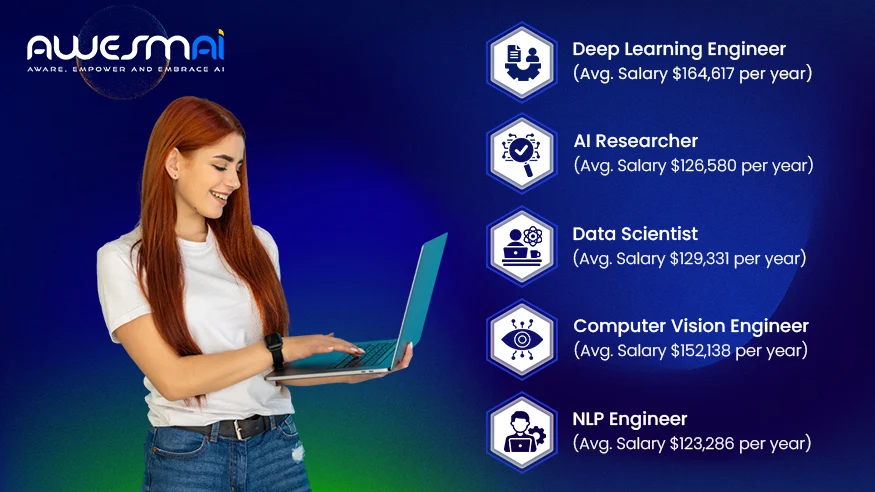
Your career can reach a new height if you take classes in deep learning.
- Better problem-solving: You will learn how to break down tough problems and use data to find smarter, quicker solutions.
- More innovation and creativity because, with deep learning, you are able to build new tools, apps, and ideas that transform entire industries.
- Higher Employability: Companies around the world are looking for skills in deep learning and AI. If you learn the right way, the chances of getting employed will increase greatly.
- Future-proofing skills: Deep learning, with automation constantly on the rise, means your learned skills will become valuable for many years to come.
- Flexible career paths: You can employ these abilities in many areas, such as healthcare, robotics, finance, IT, and entertainment.
- Opportunities all over the world: You can learn skills that will help you work on a global level from the comfort of your own home, like with a free deep learning course.
Once you master these skills, you can make a difference at the intersection of creativity, technology, and new ideas.
Final Words
Deep learning is what will shape the future. It’s not coding or data. It’s about learning how intelligence itself works.
The world is getting increasingly automated and AI-driven day by day. The fact is, whoever learns deep learning now will lead this transformation.
Start small. Take up the right course pertaining to deep learning for AI, work on projects, and get certified. Each step you take helps build your future-ready career. That’s how your skills will not just survive but thrive.
FAQs
1.What is deep learning specialisation?
The course is well-structured. It’s all about neural networks, right from the basics to advanced applications, along with a blend of theory and practical coding projects, preparing you for AI jobs.
2. Is deep learning relevant in 2026?
Yes, it is the most relevant topic in 2026. Nearly all industries now apply AI systems rooted in deep learning. The demand for professionals with these skills has grown annually.
3.What skills are required for deep learning?
You need basic maths, like algebra and calculus; some programming skills, mostly in Python; and curiosity to find out how data becomes insight.
4. What is the best course for deep learning?
Choosing the best course for deep learning depends on experience. Beginners need basics, and pros need advanced, project-based learning.
5. How many months do you need to learn deep learning?
Depending on whether you’re starting from scratch, it usually takes about three to six months of continuous learning and practising. If you’ve had experience beforehand, you can pick it up within one to three months.




